By William Ernest Henley
Out of the night that covers me,
Black as the pit from pole to pole,
I thank whatever gods may be
For my unconquerable soul.
In the fell clutch of circumstance
I have not winced nor cried aloud.
Under the bludgeonings of chance
My head is bloody, but unbowed.
Beyond this place of wrath and tears
Looms but the Horror of the shade,
And yet the menace of the years
Finds and shall find me unafraid.
It matters not how strait the gate,
How charged with punishments the scroll.
I am the master of my fate:
I am the captain of my soul.
Henley, the poet, was hospitalized for tuberculosis. One of his legs was amputated in order to save his life; it was said to be very painful. Immediately after the amputation, he received news that another operation would have to be done on his other leg. However, he decided to enlist the help of a different doctor named Joseph Lister. Under Lister’s care he was able to keep his other leg by undergoing intensive surgery on his remaining foot. While recovering from this surgery in the infirmary, he was moved to write the words of this poem Invictus. This period of his life, coupled with the reality of an impoverished childhood, plays a major role in the meaning behind the poem. [Wikipedia]

Mirific words in a so inspired poem. There is no chance, no room for surrender. The struggle extends to the infinite